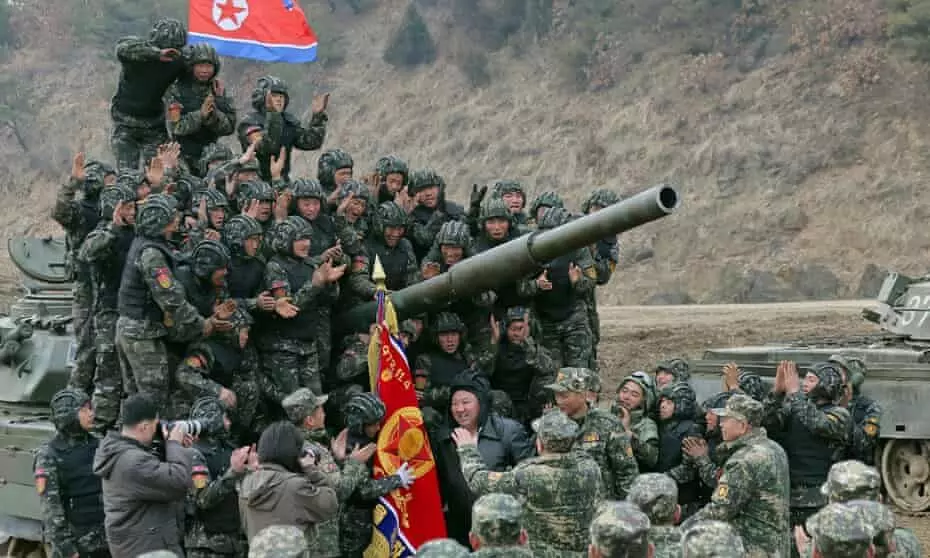The Fragility of Peace: The Impact of North Korea’s Military Involvement in the Ukraine War on Global Diplomacy
"North Korea's military aid to Russia in Ukraine war complicates peace, undermines sovereignty & pressures global diplomacy. Get the latest updates!";

Peace dialogues between nations have always been delicate, requiring skilled diplomacy, mutual trust, and strategic negotiations. The ongoing war between Russia and Ukraine has already tested global stability, and now, with North Korea's direct military involvement in support of Russia, the situation has become even more complex. The implications of this development not only threaten Ukraine's sovereignty but also put immense pressure on international diplomacy, particularly for the European Union and the United States.
For months, peace talks between Russia and Ukraine have been attempted, with varying degrees of success. Mediated largely by Western nations, particularly the United States, these discussions sought to bring an end to a war that has displaced millions and reshaped global alliances. However, North Korea’s recent troop deployment to Russia signals a shift toward further militarization instead of negotiation. This move complicates peace efforts as Ukraine faces an even stronger adversary on the battlefield, undermining any possibility of a swift resolution.
The fragile nature of peace talks is evident in the response from global powers. The United Nations has condemned North Korea’s actions, calling them a direct violation of international norms. The U.S., once eager to maintain its role as a mediator, has now threatened to withdraw from diplomatic negotiations altogether. European nations, steadfast in their support for Ukraine, now find themselves in a more precarious position, uncertain of how best to counter this unexpected alliance between Moscow and Pyongyang.
North Korea's military involvement in the war introduces new dynamics into an already volatile geopolitical landscape. Historically, North Korea has been isolated from most international conflicts, focusing instead on its own regional tensions with South Korea and the West. However, its decision to openly back Russia raises questions about its long-term ambitions, its diplomatic strategy, and the repercussions for global security.
For Russia, North Korea’s support is invaluable. With growing sanctions and limited international allies, Moscow benefits significantly from Pyongyang’s military assistance. Reports indicate that North Korean troops are deployed to areas where Russian forces have struggled, providing additional manpower and artillery capabilities. This strengthens Russia’s war efforts and allows it to continue resisting Western pressure, particularly the European Union’s substantial military aid to Ukraine.
The European Union’s position in this conflict has always been clear—full support for Ukraine. However, North Korea’s involvement now demands a reassessment of strategy. EU leaders must decide whether to escalate their own military assistance or push for stronger sanctions against both Russia and North Korea. The risk, of course, is further escalating tensions in an already fragile situation.
Russia and North Korea are using diplomatic tactics to weaken Ukraine’s morale and political standing. Moscow has long relied on disinformation campaigns and intimidation strategies to deter Ukraine’s efforts and discourage Western support. With North Korea in the equation, these tactics have intensified.
North Korea’s leader, Kim Jong Un, has portrayed the deployment of troops as an act of defiance against Western interference, labeling Ukraine and its allies as pawns in an American-led agenda. This rhetoric is designed to discourage European nations from increasing their support for Ukraine, sowing division among allies, and casting doubt on the legitimacy of the Ukrainian resistance.
Meanwhile, Russia is leveraging this new alliance to further isolate Ukraine diplomatically. By forming stronger ties with North Korea, Moscow is signaling to other authoritarian regimes that Western opposition can be countered through military solidarity. This could inspire other nations with strained relationships with the West—such as Iran or Syria—to reconsider their stance and potentially provide additional support to Russia.
The Future of Global Stability
As the war continues, the long-term consequences of North Korea’s military involvement are unpredictable. One certainty, however, is that diplomacy has suffered a significant blow. The anticipated peace dialogues, which once seemed to offer a path forward, now hang in uncertainty. With the U.S. threatening to withdraw from mediation, and Europe scrambling to reassess its approach, the prospects for de-escalation appear bleak.
The international community now faces the challenge of recalibrating diplomatic efforts. Should global leaders attempt new peace negotiations despite heightened tensions? Or should they accept that dialogue is unlikely and shift focus toward military deterrence? These are questions with no easy answers, and the coming weeks will determine whether the world moves closer to resolution or further into conflict.
One thing remains clear—the fragility of peace has never been more evident. The war in Ukraine is no longer just a battle between two nations; it has transformed into a confrontation of alliances, ideologies, and shifting power structures that will shape global diplomacy for years to come.

